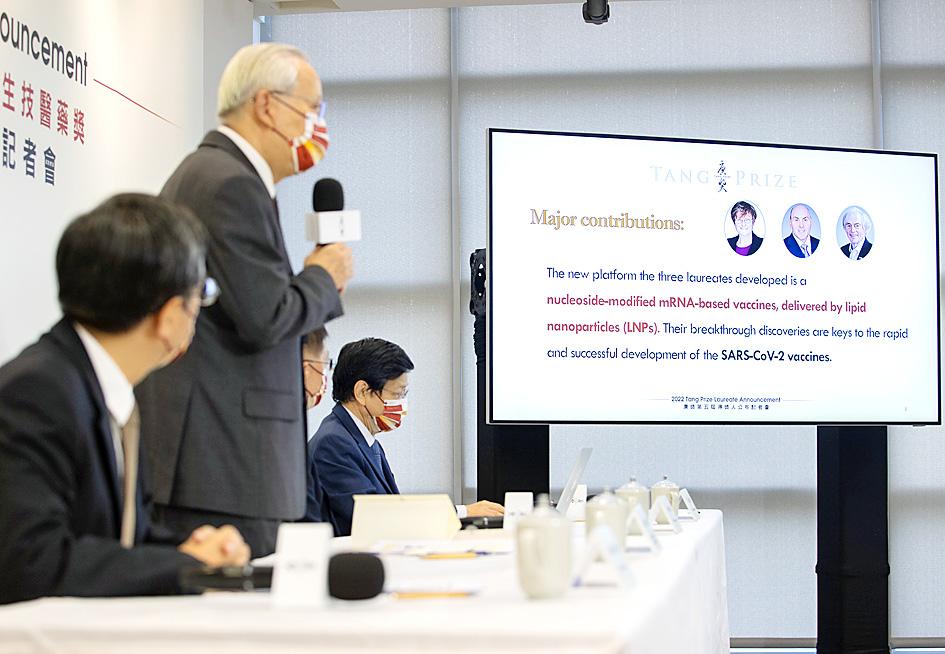Three scientists whose research laid the foundation for messenger RNA (mRNA) COVID-19 vaccines were named the winners of the 2022 Tang Prize in Biopharmaceutical Science at a ceremony in Taipei yesterday.
Katalin Kariko, Drew Weissman and Pieter Cullis were recognized “for the discovery of key vaccinology concepts and approaches, leading to the successful development of mRNA-based COVID-19 vaccines,” the Tang Prize Foundation said.
The technologies developed by the three laureates “not only revolutionized vaccinology, but also signaled a paradigm shift in protein therapy. They represent the advent of a new era of RNA-based therapies,” the foundation said.

Photo: CNA
Kariko and Weissman, who have worked together for more than two decades, created a modified version of mRNA that would not cause an inflammatory response when injected into the body. The technology is used in the Pfizer-BioNTech and Moderna COVID-19 vaccines.
Cullis is a pioneer in delivery systems for mRNA to human cells, based on lipid nanoparticles, which are bubbles of fat that wrap around and protect mRNA.
In a recorded video, Kariko said she was honored and humbled to learn that she had received the award along with Weissman and Cullis.
Weissman said a shared interest in science, a hunger for learning and perseverance formed the foundation of his partnership with Kariko.
Cullis credited his collaborators and colleagues for the award.
“The award is really being given for the work of literally hundreds of people that I’ve had the pleasure to work with over the last 40 years, so it’s really fantastic,” he said.
The three also credited curiosity, collaboration and finding joy in their work as critical to their efforts in the research.
Kariko is an adjunct professor at the University of Pennsylvania and a senior vice president at BioNTech. She was born in Hungary and moved to the US after obtaining a doctorate in biochemistry.
Weissman, a US researcher, is the director of vaccine research at the University of Pennsylvania Perelman School of Medicine.
Cullis is a professor of biochemistry and molecular biology at the University of British Columbia. The Canadian researcher has cofounded several companies, including Integrated Nano Therapeutics, Molecular You and Acuitus Therapeutics.
The Tang Prize is a biennial award established in 2012 by Taiwanese entrepreneur Samuel Yin (尹衍樑), chairman of the Ruentex Group, to honor people who have made prominent contributions in four categories: sustainable development, biopharmaceutical science, Sinology and rule of law.
The winners in each category share a cash award of NT$40 million (US$1.35 million) and NT$10 million in research funding.

Taiwan has received more than US$70 million in royalties as of the end of last year from developing the F-16V jet as countries worldwide purchase or upgrade to this popular model, government and military officials said on Saturday. Taiwan funded the development of the F-16V jet and ended up the sole investor as other countries withdrew from the program. Now the F-16V is increasingly popular and countries must pay Taiwan a percentage in royalties when they purchase new F-16V aircraft or upgrade older F-16 models. The next five years are expected to be the peak for these royalties, with Taiwan potentially earning

STAY IN YOUR LANE: As the US and Israel attack Iran, the ministry has warned China not to overstep by including Taiwanese citizens in its evacuation orders The Ministry of Foreign Affairs (MOFA) yesterday rebuked a statement by China’s embassy in Israel that it would evacuate Taiwanese holders of Chinese travel documents from Israel amid the latter’s escalating conflict with Iran. Tensions have risen across the Middle East in the wake of US and Israeli airstrikes on Iran beginning Saturday. China subsequently issued an evacuation notice for its citizens. In a news release, the Chinese embassy in Israel said holders of “Taiwan compatriot permits (台胞證)” issued to Taiwanese nationals by Chinese authorities for travel to China — could register for evacuation to Egypt. In Taipei, the ministry yesterday said Taiwan

Taiwan is awaiting official notification from the US regarding the status of the Agreement on Reciprocal Trade (ART) after the US Supreme Court ruled US President Donald Trump's global tariffs unconstitutional. Speaking to reporters before a legislative hearing today, Premier Cho Jung-tai (卓榮泰) said that Taiwan's negotiation team remains focused on ensuring that the bilateral trade deal remains intact despite the legal challenge to Trump's tariff policy. "The US has pledged to notify its trade partners once the subsequent administrative and legal processes are finalized, and that certainly includes Taiwan," Cho said when asked about opposition parties’ doubts that the ART was

If China chose to invade Taiwan tomorrow, it would only have to sever three undersea fiber-optic cable clusters to cause a data blackout, Jason Hsu (許毓仁), a senior fellow at the Hudson Institute and former Chinese Nationalist Party (KMT) legislator, told a US security panel yesterday. In a Taiwan contingency, cable disruption would be one of the earliest preinvasion actions and the signal that escalation had begun, he said, adding that Taiwan’s current cable repair capabilities are insufficient. The US-China Economic and Security Review Commission (USCC) yesterday held a hearing on US-China Competition Under the Sea, with Hsu speaking on